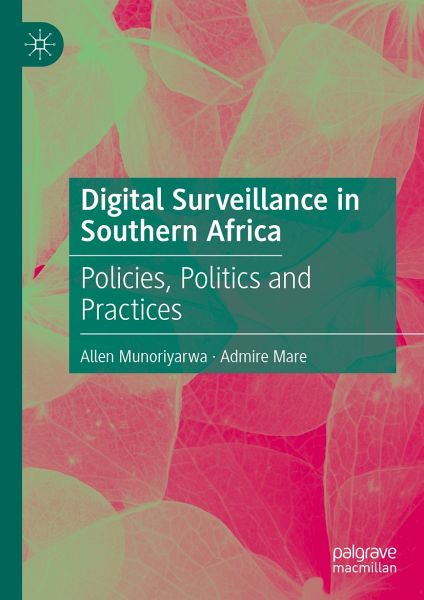
Digital Surveillance in Southern Africa (eBook, PDF)
Policies, Politics and Practices
Versandkostenfrei!
Sofort per Download lieferbar
88,95 €
inkl. MwSt.
Weitere Ausgaben:

PAYBACK Punkte
44 °P sammeln!
This book critically examines the manifest and latent practices of surveillance in the southern African region, using case studies from South Africa, Zimbabwe, Zambia, Namibia, Botswana and Mozambique. The book demonstrates the growing role of super-powers in the construction and normalization of the surveillance state. It traces the digitization of surveillance practices to the rapid adoption of smart CCTV, facial recognition technologies and EMSI catchers. Through predictive policing mechanisms, state security agencies have appropriated digital media technologies for sentiment analysis, cons...
This book critically examines the manifest and latent practices of surveillance in the southern African region, using case studies from South Africa, Zimbabwe, Zambia, Namibia, Botswana and Mozambique. The book demonstrates the growing role of super-powers in the construction and normalization of the surveillance state. It traces the digitization of surveillance practices to the rapid adoption of smart CCTV, facial recognition technologies and EMSI catchers. Through predictive policing mechanisms, state security agencies have appropriated digital media technologies for sentiment analysis, constant monitoring of digital footprints of security targets, and even deploying cyber-troops on popular social media platforms.
The authors argue that surveillance practices have thus been digitized with deleterious impact on the right to privacy, peaceful assembly and freedom of expression in the region. Furthermore, they argue that specific laws and regulations governing surveillance practices in the region are lagging behind. Finally, the book demonstrates how digital surveillance have significantly infiltrated the political, economic and social fabric of Southern Africa.
This book provides much needed systematic, cutting-edge research into the trends, practices, policies and geo-political interests at the center of surveillance practices in the region, providing a crucial link between human rights, such as freedom of privacy and expression, and political authoritarianism.
Dieser Download kann aus rechtlichen Gründen nur mit Rechnungsadresse in A, B, BG, CY, CZ, D, DK, EW, E, FIN, F, GR, HR, H, IRL, I, LT, L, LR, M, NL, PL, P, R, S, SLO, SK ausgeliefert werden.












